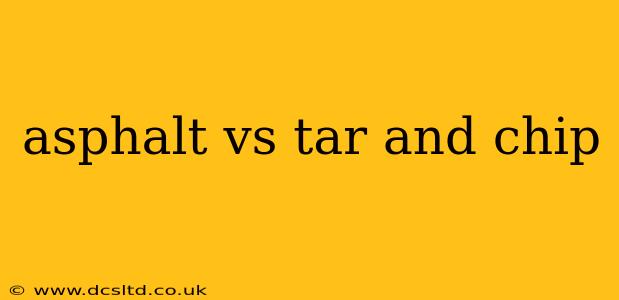Choosing the right road surface for your driveway, parking lot, or roadway is a crucial decision impacting longevity, aesthetics, and cost. Two common options are asphalt and tar and chip. While both offer durable surfaces, they differ significantly in their composition, application, maintenance, and overall lifespan. This comprehensive guide will delve into the key distinctions between asphalt and tar and chip, helping you make an informed choice.
What is Asphalt?
Asphalt is a refined petroleum product mixed with aggregates (like crushed stone, sand, and gravel) and fillers. This mixture, known as asphalt concrete, is heated and laid down in layers, compacted to form a smooth, durable surface. Asphalt pavements are known for their relatively smooth ride, quick installation, and ease of maintenance (compared to tar and chip).
What is Tar and Chip?
Tar and chip, also known as chip seal, is a less expensive, more rustic road surface. It involves applying a layer of liquid asphalt (or tar) to the existing road surface followed by embedding small stones (chips) into the hot asphalt. The excess chips are then swept away, leaving a textured, pebbled surface.
Asphalt vs. Tar and Chip: Key Differences
| Feature | Asphalt | Tar and Chip |
|---|---|---|
| Cost | Higher initial cost | Lower initial cost |
| Appearance | Smooth, uniform surface | Textured, pebbled surface |
| Durability | More durable, longer lifespan | Less durable, shorter lifespan |
| Maintenance | Requires less frequent maintenance | Requires more frequent maintenance (e.g., resealing) |
| Noise Level | Quieter | Noisier |
| Water Drainage | Generally better drainage | Can have less efficient drainage |
| Application | More complex installation process | Simpler and faster installation process |
How Long Does Asphalt Last?
The lifespan of an asphalt pavement depends on several factors, including traffic volume, weather conditions, and the quality of the initial installation. Generally, asphalt surfaces can last anywhere from 15 to 25 years, sometimes longer with proper maintenance.
How Long Does Tar and Chip Last?
Tar and chip surfaces typically last for 3 to 5 years before requiring resealing or replacement. The lifespan can be shortened due to factors like heavy traffic, harsh weather conditions, and poor initial application.
Which is Better for My Driveway?
The best choice for your driveway depends on your budget and preferences. Asphalt provides a more polished, longer-lasting solution, albeit at a higher initial cost. Tar and chip is a more budget-friendly option, but it will require more frequent maintenance and has a shorter lifespan. Consider your priorities—a smooth, low-maintenance surface versus a more rustic, budget-conscious choice.
Which is Better for a Roadway?
For roadways, the choice between asphalt and tar and chip is often influenced by factors such as traffic volume and budget constraints. High-traffic roads usually benefit from the durability and longevity of asphalt. Tar and chip might be suitable for low-traffic roads or temporary solutions where cost is a primary concern.
Is Tar and Chip Slippery When Wet?
Yes, tar and chip surfaces can become slippery when wet, especially during the initial period after application before the chips are fully embedded. The textured surface offers some grip, but caution is advised when driving on wet tar and chip surfaces.
Can You Resurface Tar and Chip?
Yes, tar and chip surfaces can be resurfaced, typically by applying another layer of tar and chip. However, eventually, a complete replacement may be necessary due to the cumulative wear and tear.
What is the Difference in Cost Between Asphalt and Tar and Chip?
The cost difference is significant. Tar and chip is considerably cheaper upfront, but the ongoing maintenance costs eventually balance out, especially considering the shorter lifespan of tar and chip. Get multiple quotes from contractors to compare prices in your area.
In conclusion, the choice between asphalt and tar and chip depends heavily on individual needs and priorities. While asphalt offers superior durability and longevity, tar and chip provides a more cost-effective, albeit shorter-lived, option. Carefully weigh the pros and cons of each before making your decision.
